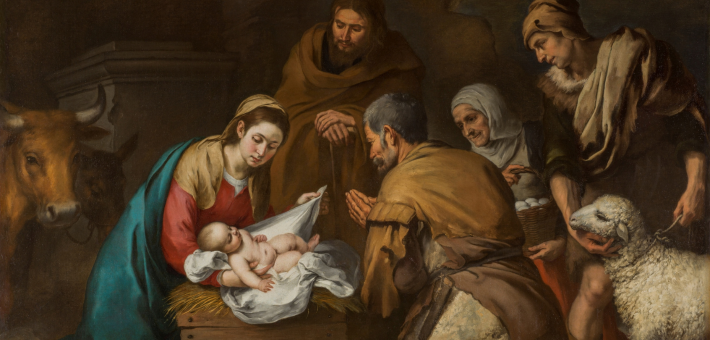Commentary on Luke 2:8-20
The song of the angels in Luke 2:14, traditionally known as the Gloria, speaks of the heavens and the earth, God and human beings. While the Greek text does not state the word for “heavens” but rather implies it, the song’s cosmology locates God above all⎯in a heavenly realm higher even than that of the angels who sing of the Most High God.
Turning in the direction of divine activity, the second line shifts to the earthly plane with the angels’ proclamation of peace upon earth and upon all people favored by God. Reinforcing this shift is the song’s poetic structure, which places the word for “human beings” in the second line in parallel relationship to “God” in the first (en hypsistois theoi … en anthrōpois). Sung within the context of Luke’s infancy narrative, the implication is clear: The peace that God desires for earth and its peoples is found in Jesus.
The interplay between the glorious and the humble, the heavenly and the earthly, the divine and the human⎯so densely presented in the Gloria⎯informs Luke 2:8–20. The passage begins and ends with shepherds. We meet them as they tend their flock (2:8). By the time we leave them, they are “glorifying and praising God for all they [have] heard and seen” (2:20). Clearly, something made this more than a typical night in the fields.
The basic pattern of angelic visits seen in the accounts of Zechariah (1:8–20) and Mary (1:26–38) mostly repeats itself in 2:9–12: an angel (Gabriel again?) suddenly appears, strikes fear in the witnesses, exhorts them not to be afraid, delivers them a message, and informs them of a sign that will confirm its validity. The angel says he brings “good news” (2:10), using the verb the early Christians adopted for spreading the gospel (euangelizomai). By specifying that his news brings “great joy” (charan megalēn), the angel presents it as the antidote to what the text literally describes in 2:9 as the shepherds’ “great fear” (phobon megan).
God’s “glory” (doxa, a term that highlights divine splendor and presence) envelops the shepherds (2:9), who are working at night (2:8)⎯a dramatic representation that fulfills words Zechariah had sung earlier: “The dawn from on high will break upon us” (1:78). Heavenly light breaks into the shepherds’ world to dispel darkness.
The content of the angel’s gospel message is the birth of the Savior, Messiah, and Lord (2:11). That the Savior is born “this day” is no generic chronological marker but rather is announced with a word (sēmeron) used throughout Luke’s Gospel to refer to the inbreaking of God’s salvation (4:21; 5:26; 13:32, 33; 19:5, 9; 23:43). The titles applied to Jesus indicate why Jesus’ birth is cause for joy: “Savior” ties Jesus to God’s activity of rescue and deliverance, “Messiah” identifies him as God’s promised agent to aid in Israel’s salvation, and “Lord” proclaims him worthy of reverence and worship.
Roman imperial propaganda applied the titles “Savior” and “Lord” to the emperor. The angel, however, makes clear to the shepherds and Luke’s readers who is their real Savior and Lord: not the emperor in his royal palace dressed in ruler’s garb, but the child in a manger in Bethlehem (the city of David), wrapped in swaddling clothes (2:11–12). In this intervention of divine grandeur into human life, we find an implicit critique of human aspirations for grandeur. God is found among the humble, not the powerful.
After the angel delivers his message, more angels appear (2:13). The language that describes them is decidedly militaristic. Literally, “a multitude of the heavenly army” (see the alternate translation in the New Revised Standard Version note) proclaims peace on earth. Luke again plays against imperial propaganda, which touted the Pax Romana, an extended period of stability and peace within the empire. This so-called peace came via the military might and violence of Rome.
Despite establishing Jesus as a contrast to the emperor, Luke apparently cannot help but use militaristic imagery to proclaim the peace that Jesus brings, which clues us in to how the permeating effects of empire affect the way we think, speak, and ultimately act upon our thoughts and words. However inadvertently, this passage provides preachers an opportunity to lead their congregation in reflection on whether and how we today, by our words, actions, and ways of life, provide a real⎯and peaceful⎯alternative to the ways of the world.
Like Mary following Gabriel’s appearance (1:36–40), the shepherds go to see the sign revealed to them “with haste” (2:15–16), a detail that adds to the excitement of the scene. The shepherds not having been told the identity of Jesus’ parents, the angel’s sign of a child in a manger suffices. They find Mary and Joseph and deliver the good news about their child (2:17).
Others hear it, too, and respond with amazement (2:18)⎯a typical reaction to divine activity in Luke-Acts (for example, 4:22; 4:36; 5:26; Acts 2:12; 3:10). Mary, for her part, treasures and ponders their message despite having heard it herself earlier from Gabriel (Luke 1:26–38), which suggests ongoing discernment over God’s activity and who Jesus is as a component of discipleship.
The passage ends with the shepherds returning home while praising God (2:20). This anticipates the response of Jesus’ disciples to his ascension. They return to Jerusalem “with great joy” and continually bless God with praise (24:52–53). Like Mary, the shepherds are models of discipleship. They hear and see the good news of God’s salvation and deliver it to others.
As shepherds, their central task is to watch over their flock (2:8), which explains why shepherding appears in the Scriptures as a potent metaphor for what kings are supposed to do and what God does (for example, Ezekiel 34:1–16; Psalm 23:1–3): protect and nurture the people under their care. Just as shepherds keep watch over their flock, so does God care for God’s people by sending them the Savior, Messiah, and Lord to whom the shepherds bear witness. For all who accept it, this is news of great joy.
PRAYER OF THE DAY
Infant holy,
We praise God for this day when we celebrate your miraculous birth! Transform us as you were transformed so that we may perfectly love you with our whole being, for the sake of the one who came humble and powerless, and became glory and power, Jesus Christ. Amen.
HYMNS
O come, all ye faithful ELW 283, H82 83, UMH 234, NCH 135
Angels from the realms of glory ELW 275, H82 93, NCH 126, UMH 220
Go tell it on the mountain ELW 229, H82 99, NCH 154, UMH 251, TFF 52
CHORAL
While shepherds watched, Hugo Jungst


December 25, 2024